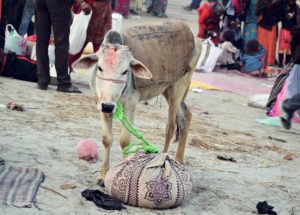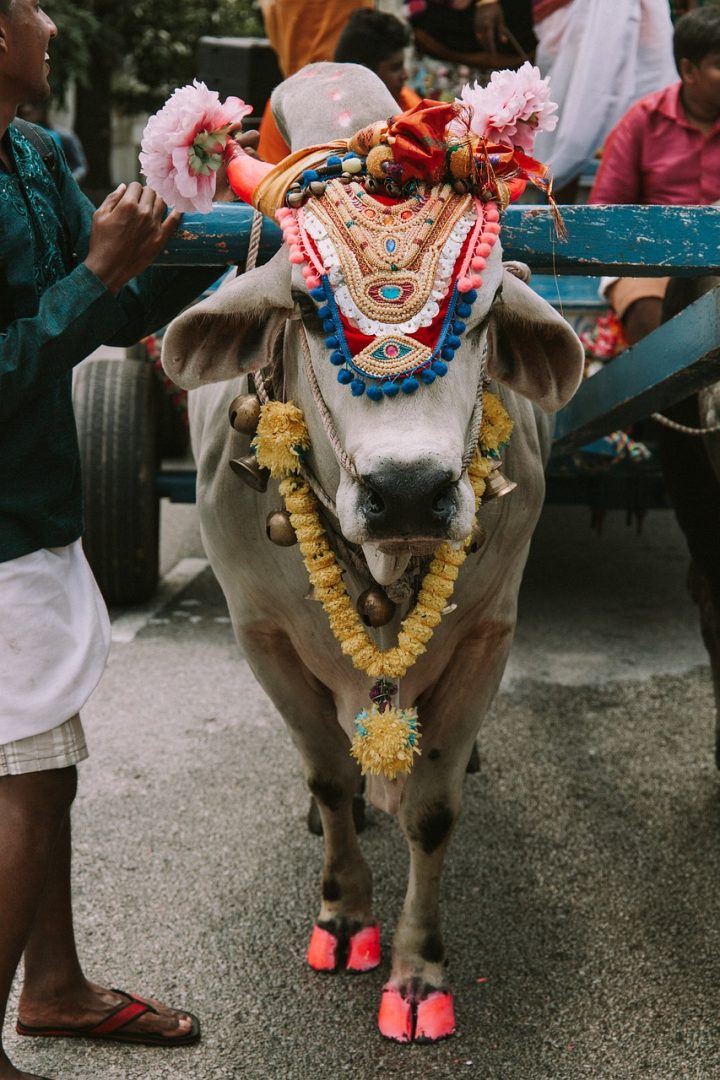When the average westerner sees a cow on the loose, he feels the urge to capture and control it. I happen to live in a ranching country, where any stray cow is summarily penned and processed. That’s because of a westerner, a cow is a commodity. We breed them, feed them, medicate them, fatten them and slaughter them. In short, we use them. That’s why at first glance the Hindu treatment of cows looks so strange to us. What we fail to grasp is that Hindus use cows too. They just use them for something else. They use them as an occasion to show reverence. They use them as a reminder of their dedication to the principles of their religion.
Non-Hindu people have their own peculiar religious habits.
And probably, to Hindu devotees, these habits seem fairly inexplicable. What do they make of Catholics kissing the Crucifix on Good Friday? What’s their reaction to reports of the Dukhobors burning their own homes and stripping naked when testifying in court? These people must seem deranged indeed to Hindu worshipers unless they understand why the people do these things. The western attitude toward India’s sacred cows is generally one of levity and disrespect, fueled by ignorance.
Ignorance, a complete disinterest in learning about alternate religions or lifestyles and a feeling of racial superiority are the ongoing legacy of the British Empire in India. Most western nations still harbor these attitudes toward the Hindu devotees of the world. We’ve been raised with the Victorian attitudes toward indigenous peoples which fill our libraries and art galleries with paternalistic eloquence. Beautifully written, painted with expertise, and oh, so condescending and dismissive. Of course, the British Potentates looked on the unusual Hindu practice of revering the lowly, barnyard cow, of all things, as clear evidence of inferior thinking. Certainly, the omniscient Brits knew the CORRECT methods of animal husbandry. After all, what self-respecting Englishman would allow one of his cows to roam at will, fending for herself, depending on the kindness of strangers, finding rest and comfort wherever she could? This practice had to be wrong. It denoted neglect of the animal by a careless, indolent owner. It created havoc on the already teeming streets of India’s overcrowded cities.
No, no! It simply won’t do, old chap! Not at all! We must maintain control, old boy, what? Wot? Harrumph!
Great Respect to Cows
There is no agreement as to just how the sacred cows came to be revered as holy. But there is general consensus that in the early days of Hinduism, cows were domesticated and treated like any other farm animal. Then, gradually, dating from the time when Buddhism and Jainism were gaining popularity, devout Hindu practitioners stopped killing their cows and started to treat them with great respect. Theories abound as to the reasons, the timing, the location and the philosophy behind this radical change in cow treatment. But when examining the current western attitude to sacred cows, we need not delve too deeply into the origins of the sanctification of the cow. We’re trying to gauge the reaction of westerners to this phenomenon.
 People round “these here parts” will always be puzzled about the cows roaming freely on India’s streets. But this is a dusty little ranching town. I can only hope that as our children head off to the cities to get a university education, they’ll broaden their experience by meeting and talking to some followers of the Hindu faith. The open-minded debate is the best way to learn when coupled with careful research. I hope our kids will discover the answers to many of life’s most baffling mysteries. Like why bread always lands, jam side down, when it falls on the floor. Like why mothers smack their children after rescuing them from deadly danger. Like why most fathers have a huge challenge in trying to relate to their own sons. And maybe they’ll even crack the biggest one of all. Why do followers of the Hindu faith treat cows as holy, according to them every respect and freedom, no matter how inconvenient it maybe? Why do they have the same humility before cows that westerners have when dealing with members of the clergy?
People round “these here parts” will always be puzzled about the cows roaming freely on India’s streets. But this is a dusty little ranching town. I can only hope that as our children head off to the cities to get a university education, they’ll broaden their experience by meeting and talking to some followers of the Hindu faith. The open-minded debate is the best way to learn when coupled with careful research. I hope our kids will discover the answers to many of life’s most baffling mysteries. Like why bread always lands, jam side down, when it falls on the floor. Like why mothers smack their children after rescuing them from deadly danger. Like why most fathers have a huge challenge in trying to relate to their own sons. And maybe they’ll even crack the biggest one of all. Why do followers of the Hindu faith treat cows as holy, according to them every respect and freedom, no matter how inconvenient it maybe? Why do they have the same humility before cows that westerners have when dealing with members of the clergy?
Only when we have an understanding of the Hindu belief system, will we improve our attitude toward the sanctification of the Indian cow. We shouldn’t make fun of what we don’t understand.
It behooooooves us to research what we don’t understand!
https://www.youtube.com/watch?v=KgEk4dPImNI






